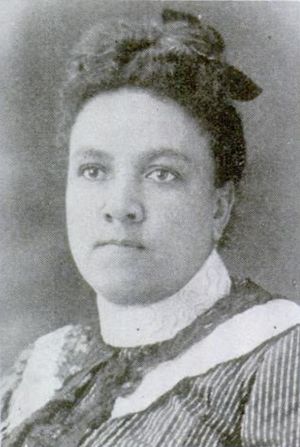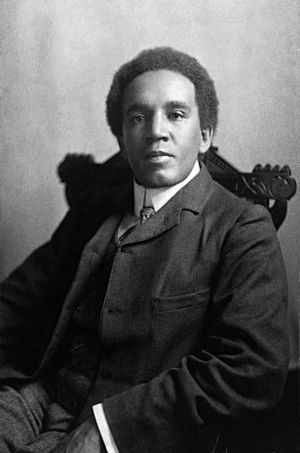Mamie Hilyer facts for kids
Quick facts for kids
Mamie Hilyer
|
|
|---|---|
 |
|
| Born |
Mamie Elizabeth Nichols
20 December 1863 |
| Died | 14 December 1916 Washington D.C.
|
| Resting place | Columbian Harmony Cemetery |
| Occupation | Pianist, promoter of classical music |
| Organization | Treble Clef Club; the Samuel Coleridge-Taylor Choral Society |
| Spouse(s) | Andrew F. Hilyer |
Mamie Hilyer (born Nichols; 1863–1916) was an African American pianist. She was known for helping to share classical music in Washington D.C.. Mamie Hilyer started two important music groups: the Treble Clef Club in 1897 and the Samuel Coleridge-Taylor Choral Society in 1901. She played a big part in helping music grow in the city.
Contents
Early Life and Family
Mamie Elizabeth Nichols was born in Washington D.C. on December 20, 1863. In 1886, she married Andrew Franklin Hilyer. He was a businessman, writer, and a leader in civil rights.
Mamie and Andrew had a son named Gale Pillsbury Hilyer, born in 1891. Gale went to Howard University and the University of Minnesota. He became a lawyer and helped start a branch of the NAACP in Minneapolis. The Hilyers also had a daughter named Kathleen.
Mamie Hilyer was a very good piano player. She was also an important person in the city's Black upper class. She strongly believed in bringing good music to Black people in Washington D.C.
The Treble Clef Club
In 1897, Mamie Hilyer started the Treble Clef Club. This group was very important. It helped lead the community by holding yearly concerts and supporting young musicians. The club brought together professional women musicians and music teachers. They wanted to study music and improve their skills. Mamie Hilyer once said it was "a small band of married women who are music lovers." Harriet Gibbs Marshall was another founding member.
The Treble Clef Club focused on music by Black composers. They wanted to bring the "best music" to the community. They were praised across the country for how well they did. The historian Doris Evans McGinty said the group likely grew out of the Black women's club movement. This movement became stronger when the National Association of Colored Women (NACW) was founded in 1896. The NACW's motto was "Lifting as We Climb." This meant they wanted to help their communities and themselves.
The club's yearly public concert was the only high-quality music show given for free in Washington D.C. at that time. Even in 1961, the Treble Clef Club was still active. It was known for making great contributions to the cultural life of Washington D.C.
The Samuel Coleridge-Taylor Choral Society

Mamie Hilyer had the idea to form the Samuel Coleridge-Taylor Choral Society in 1901. She met Samuel Coleridge-Taylor on a trip overseas. He was a famous Black British composer, conductor, and violinist. Frederick J. Loudin helped them meet.
When Mamie Hilyer returned to the United States, she worked hard to create a choir. This choir would perform Coleridge-Taylor's music. She helped promote and raise money for the Society. She did this by playing piano and other efforts. The Treble Clef Club also helped by creating public interest and raising funds. They held musical teas and gatherings. Mamie Hilyer, Emma Williams, Josephine Ball, and Amanda Gray formed a singing group called the Chibiabos Quartet. This name came from Longfellow's poem, "The Song of Hiawatha."
The Samuel Coleridge-Taylor Choral Society had between 160 and 200 singers. Local and national African American newspapers praised them. They welcomed audiences of all races. Sometimes, so many people came that some had to be turned away.
From the start, the group hoped to invite Coleridge-Taylor to Washington. In 1904, Coleridge-Taylor traveled from London. He conducted the society in performing his cantata Hiawatha's Wedding Feast. He publicly praised the accompanist Mary Europe. This helped make her more famous and brought her new audiences in Washington's music scene.
Death
Mamie Hilyer passed away on December 14, 1916. A newspaper in Minneapolis called The Appeal reported her death as "rather sudden." It said she had a surgery several weeks before that was thought to be successful. The paper noted Mamie Hilyer's important role in the "musical life of the capitol."
 | Delilah Pierce |
 | Gordon Parks |
 | Augusta Savage |
 | Charles Ethan Porter |

